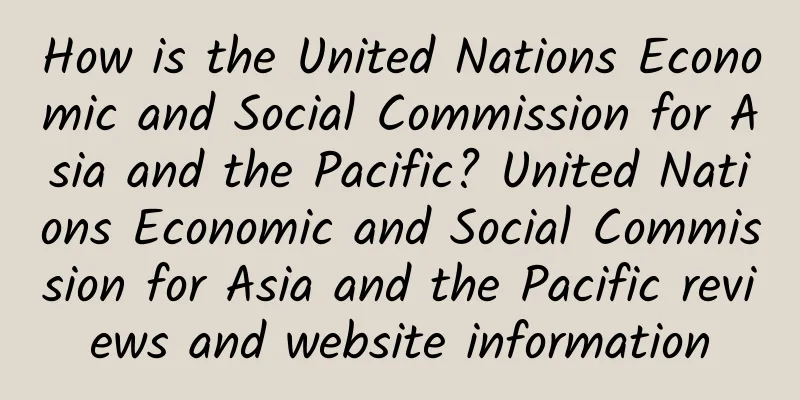How is the United Nations Economic and Social Commission for Asia and the Pacific? United Nations Economic and Social Commission for Asia and the Pacific reviews and website information

|
What is the website of the United Nations Economic and Social Commission for Asia and the Pacific? The United Nations Economic and Social Commission for Asia and the Pacific (ESCAP; ESCAP for short) is a branch of the United Nations. It was established in 1947 and is affiliated to the United Nations Economic and Social Council. Its headquarters is located in Bangkok, Thailand. Its main responsibility is to promote the economic and social development of its member states. Website: www.unescap.org UNESCAP: An international force in promoting regional developmentThe United Nations Economic and Social Commission for Asia and the Pacific (ESCAP) is an important regional branch of the United Nations system. As one of the subordinate agencies of the United Nations Economic and Social Council, it has been committed to promoting economic and social development in the Asia-Pacific region since its establishment in 1947. Headquartered in Bangkok, Thailand, ESCAP has become a key platform for connecting member countries, supporting policy dialogues and providing technical assistance over the past few decades. This article will explore ESCAP's historical background, organizational structure, main functions, and its role and challenges in the era of globalization, and analyze its contribution to promoting sustainable development with specific cases. Through these contents, readers can better understand how this international organization contributes to the prosperity and stability of the Asia-Pacific region. History: From establishment to developmentThe origins of ESCAP can be traced back to the reconstruction period after World War II. At that time, the Asia and Pacific region faced huge challenges of post-war recovery, economic recovery and social reconstruction. In response to these problems, the United Nations established the Economic Commission for Far Eastern Countries in 1947. As the number of member countries increased and regional needs changed, the agency gradually expanded its coverage and was eventually renamed the Economic and Social Commission for Asia and the Pacific. This name change not only reflects the expansion of its geographical scope, but also reflects the shift in its focus from pure economic development to broader social issues. Over the past seventy years, ESCAP has undergone many reforms and adjustments to adapt to the changing international environment and the needs of its member countries. For example, during the Cold War, ESCAP worked hard to bridge the gap between the East and the West; and after the rise of the wave of globalization, it paid more attention to issues such as regional integration and technology transfer. In addition, with the popularization of the concept of sustainable development, ESCAP has also included issues such as environmental protection and climate change into its core agenda in recent years. Organizational structure and operating mechanismAs an international organization with 53 full members and 9 associate members, ESCAP's governance structure consists of multiple levels, including the Ministerial Conference, the Executive Committee and the Secretariat.
In addition to the above main institutions, ESCAP also has a number of subsidiary institutions and regional offices to better serve specific sub-regions or thematic areas. For example, the West Asia Subregional Office focuses on cooperation projects with Arab countries, while the Pacific Island Development Forum focuses on the unique needs of small island developing countries. Main functions and focus areasESCAP's main responsibility is to help member countries achieve their economic and social development goals through policy research, technical support and capacity building. The following are its key functional areas: 1. Promote regional economic cooperationESCAP has long been committed to strengthening economic ties between countries in the region. By promoting free trade agreement negotiations, improving cross-border infrastructure construction and optimizing logistics networks, ESCAP has provided important support for improving regional competitiveness. For example, the two flagship projects, the "Asian Highway Network" and the "Pan-Asia Railway Network", aim to establish a land transportation system that runs through the entire Asia-Pacific region, thereby reducing trade costs and promoting personnel exchanges. 2. Promote sustainable developmentAs an important participant in the 2030 Agenda for Sustainable Development, ESCAP actively participates in the localization process of global goals. It assists member countries in formulating specific action plans, monitoring progress, and sharing best practices. In particular, in the fields of poverty reduction, education, and health, the technical and policy advice provided by ESCAP is of great significance to many developing countries. 3. Addressing climate change and disaster managementIn the face of the increasingly severe threat of climate change, ESCAP has increased its support for low-carbon economic transformation and climate adaptation. It assists member countries in developing clean energy solutions, improving disaster early warning systems, and advocating the use of green financial instruments. In addition, ESCAP pays special attention to small island countries that are vulnerable to natural disasters and provides them with customized assistance programs. 4. Promoting social inclusionESCAP recognizes that social inequality is an obstacle to overall development and therefore makes it one of its priorities. By supporting initiatives in areas such as gender equality, youth employment, and the rights of people with disabilities, ESCAP strives to build a more equitable and inclusive social environment. Typical case analysisTo more intuitively demonstrate the actual effectiveness of ESCAP, two specific cases are listed below: Case 1: Bangladesh Women Entrepreneurs Support ProgramIn South Asia, the proportion of female entrepreneurs is relatively low, which not only limits their personal development opportunities, but also weakens the potential for economic growth. In response to this problem, ESCAP, together with local governments and other partners, launched a project called "Empowering Women Entrepreneurs". The project has helped thousands of women successfully start or expand their businesses by providing skills training, financing channels and market matching services. According to the evaluation report, the average income of women participating in the project has increased by more than 50%, and more family members have joined the labor market. Case 2: Promotion of e-government in Southeast AsiaWith the acceleration of digital transformation, e-government has become an effective means to improve the efficiency of public services. However, due to insufficient technical infrastructure and a lack of professional talent, some Southeast Asian countries have made slow progress in this regard. To this end, ESCAP has designed a comprehensive training and technical assistance program to assist relevant countries in establishing a unified e-government platform. Through this initiative, it not only simplifies the process of citizens' affairs, but also enhances government transparency and accountability. Challenges and future prospectsDespite its remarkable achievements, ESCAP still faces many challenges. First, the differences in economic development levels among member countries make policy coordination more difficult. Second, funding shortages and limited human resources also restrict its ability to fully play its role. Finally, in the current complex and changing geopolitical situation, how to maintain a neutral position and uphold the principle of multilateralism has become a difficult problem facing ESCAP. Looking ahead, ESCAP needs to further innovate its working methods and make full use of new technologies to improve efficiency and service quality. At the same time, it should strengthen cooperation with other international organizations and non-governmental organizations to form a joint force to meet common challenges. More importantly, ESCAP should continue to adhere to the "people-oriented" development concept to ensure that all groups can benefit from regional development. ConclusionAs an indispensable part of the United Nations system, ESCAP has made great contributions to promoting peace and development in the Asia-Pacific region over the past seventy years. Whether it is promoting regional economic integration or helping to achieve the Sustainable Development Goals, ESCAP has always been at the forefront, playing the role of a bridge and catalyst. Although the road ahead is full of challenges, we have reason to believe that with the joint efforts of all member countries, ESCAP will continue to write its glorious chapter. If you want to know more about ESCAP, please visit its official website: www.unescap.org . |
>>: How is Olimpia Football Club? Olimpia Football Club Reviews and Website Information
Recommend
The efficacy and function of cauliflower
Cauliflower is also called cauliflower. Common ca...
How is Cambodia Bayon Airlines? Cambodia Bayon Airlines Reviews and Website Information
What is the website of Cambodia Bayon Airlines? Ca...
How is the University of New England in the United States? Evaluation and website information of the University of New England in the United States
What is the website of the University of New Engla...
The efficacy of honey pomelo and the use of pomelo peel
What are the effects of honey pomelo? If you don’...
The benefits of eating mud snails
Mud snail is a mollusk, mostly found in the water...
How to prevent and control early blight of tomatoes?
What should we do if tomatoes have early blight? ...
The efficacy and function of jujube and how to eat jujube
In many parts of China, it is said that if people...
How to make fried chopped green onion oil
Scallion oil is a common condiment in life. It is...
The nutritional value of drunken dates and the benefits of eating drunken dates
Drunken dates are a processed product. Fresh date...
Clam porridge
I don’t know if you have ever tasted clam porridg...
The efficacy and function of wax apples How to eat wax apples
Wax apple is a special fruit produced in tropical...
How to cook Coprinus comatus?
Each kind of food has different cooking methods, ...
The advantages and disadvantages of eating honey
Honeydew melon is a kind of melon. Because this f...
The efficacy and effects of mosquito repellent grass and the side effects of mosquito repellent grass
Mosquito repellent grass is a beautiful ornamenta...
Medicinal Benefits of Pumpkin Seeds
I'm sure everyone has eaten pumpkin, but have...









